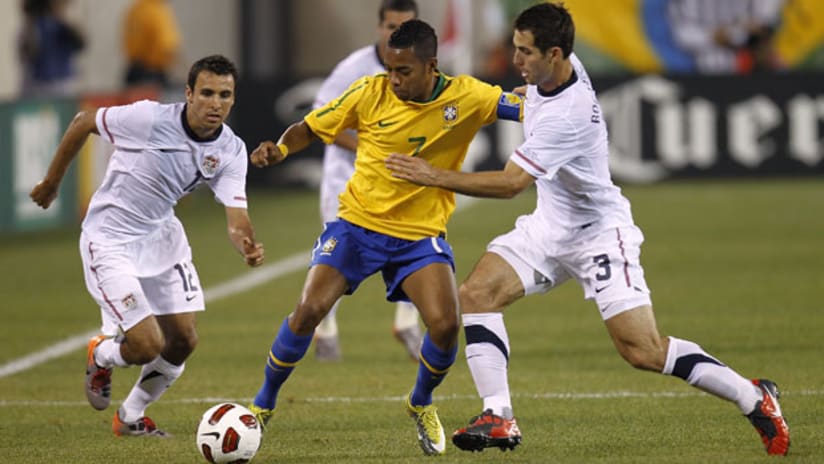EAST RUTHERFORD, N.J. – If Tuesday night's friendly taught us anything, it's that the US National Team's back line is still very much a work in progress.
While there may have been some improvements against Brazil, some of the same problems came back to haunt a side that gave up early goals in three of their four games in this summer's World Cup.
In what might be the final game of his four years in charge of the United States, head coach Bob Bradley trotted out a back line featuring three holdovers from the World Cup (Carlos Bocanegra, Jonathan Bornstein and Jonathan Spector) and one new face in Los Angeles Galaxy defender Omar Gonzalez, who earned his first cap.
Against the possession style of Brazil and their brilliant ability to dissect the field with dynamic, precision passing, the back line stayed compact and tight throughout the match. It took till the 29th minute for Brazil to take advantage of their significant edge in possession – Neymar made the most of a quality ball from the left flank to beat Bornstein in the air for the goal.
“The first 20 minutes or so, we started well,” Bradley said, noting that he was pleased with the team’s strong start and ability to press Brazil. “As we slowed down, we started to get shaky.”
In large part, it was hard to judge the efforts of the US back four against the sweltering pressure applied by the Brazilians. The midfield in front of them, with the exception of Michael Bradley, was useless in stopping the flow of the Brazilian attack.
The issue that plagued the US in South Africa was the same issue on Tuesday night, and that was a lack of concentration throughout the entire match. On Brazil’s first goal, Bornstein got caught ball-watching, then made a late read on a brilliant cross from the left flank. He arrived late to challenge Neymar and barely put in a decent challenge on the ball.
The issue isn’t as much anything tactically or even technically – even in the face of an overwhelming attack, the United States back four won the majority of their battles and played well. It was individual mistakes and an inability to play focused soccer that cost the group.
Take for example, the second Brazil goal.
On the stroke of halftime, Brazil took advantage of a miscue as the Americans looked lost on what appeared to be a failed offside trap. It was Alexandre Pato who went in alone on Tim Howard and put away the South American’s second of the night as there wasn’t an American defender within 20 yards on the effort.
Gonzalez had a shaky start in his debut, but settled in well to win his battles. Bocanegra, other than the miscue on the game’s second goal, was his normal steady self.
All told, the US were solid in their group defense and individual battles, an improvement over the World Cup. But there is still work to be done.
“I thought we frustrated them a little while,” Howard said. “A little while is not good enough.”
Kristian R. Dyer can be reached for comment at KristianRDyer@yahoo.com and followed at twitter.com/kdyer1012


